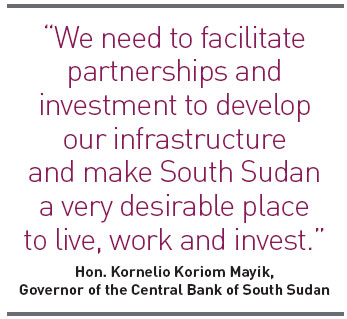IMF gives South Sudan seal of approval

Central Bank governor Kornelio Koriom Mayik works closely with global institutions to create a sound financial system

South Sudan's Central Bank governor, Kornelio Koriom Mayik, has been working closely with the World Bank and the IMF since soon after the Comprehensive peace Agreement in 2005 with Sudan to lay the foundations for a world-class financial sector, at the same time as creating sound economic institutions and, through new legislation, establishing an environment conducive to investment.
Mr Koriom says the country applied for membership of the IMF at independence in 2011, and was admitted a year later. "IMF teams regularly visit the country, and their assessments are important in reassuring foreign investors and aid donors that South Sudan is a committed member of the international financial community."
The most recent IMF visit, in mid-September, underscored the sound progress infant South Sudan is making. "South Sudan's economic outlook is improving. Oil production is rising and inflation is declining. The mission welcomes the authorities' 2013/14 budget submitted to Parliament, which strikes the right balance between increasing spending on priority areas and maintaining economic stability," said the IMF team, adding: "The mission also welcomes the authorities' plans to lift fiscal austerity gradually as the oil revenue stream becomes more certain and to move forward with other key reforms including the enactment of the Petroleum Revenue Management Act."
Mr Koriom says it is essential to engage with institutions like the IMF: "This means that the country is clean, and you are moving in the right direction and that the world can see that. That seal of approval is vital for the growth of any country that wants to become a member of the international community. We believe that with the financial resources and the expertise, we can grow the country faster."
At present, says Mr Koriom, South Sudan still lacks that expertise. Part of the process of integrating into the world economy and to attract investors has been through organising conferences to invite the international community to focus on South Sudan, the most recent of which was in November.
"We need to show the world that we are independent. Our country is free, with no sanctions, so investors can come to South Sudan. This year in March, we were in Washington to spread the word that South Sudan is a safe, secure environment for investors. Our Investment Authority is very active, very flexible: you can bring in your FDI and anytime you want to withdraw, you can do it without a problem."
At the same time, Mr Koriom believes that education is essential if the country is to overcome its skills shortage and to encourage a new generation of South Sudanese into growing the country, making them part of the development process.
"Education is vital, and the challenges we face will be met only through education. Educating the nation is what will bring South Sudan the human capital and the spirit needed in order to make this country as great as it can be. Investing in this will be a priority. Now that the oil is flowing we can use the revenue for education and the different pillars requiring investment in this country, so we can develop our own manufacturing base and not have to import absolutely everything," says Mr Koriom, adding: "Of course infrastructure, roads, bridges, railways, and airports are also our main focus. We need to facilitate partnerships and investment to develop our infrastructure and make South Sudan a very desirable place to live, work and invest."
In the meantime, South Sudan has adopted an open-door policy to people bringing in skills: "In this country we accept everybody. Everybody that comes to help in the development of South Sudan is welcomed, you don't need to be a South Sudanese national to do business here."

(China Daily European Weekly 12/20/2013 page17)
Today's Top News
- Chinese landmark trade corridor handles over 5m TEUs
- China holds first national civil service exam since raising eligibility age cap
- Xi's article on CPC self-reform to be published
- Xi stresses improving long-term mechanisms for cyberspace governance
- Experts share ideas on advancing human rights
- Japan PM's remarks on Taiwan send severely wrong signal






























